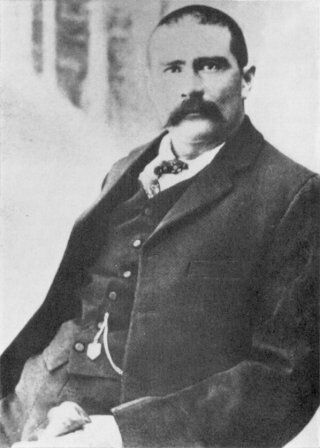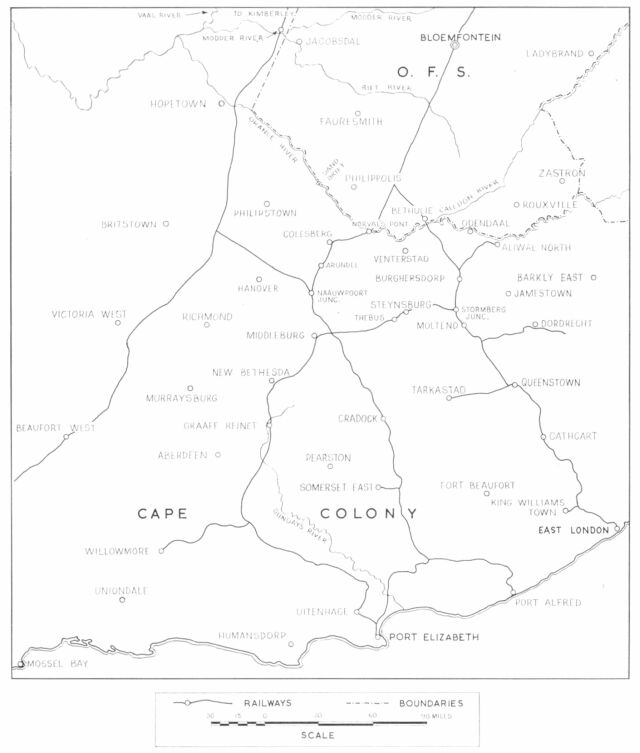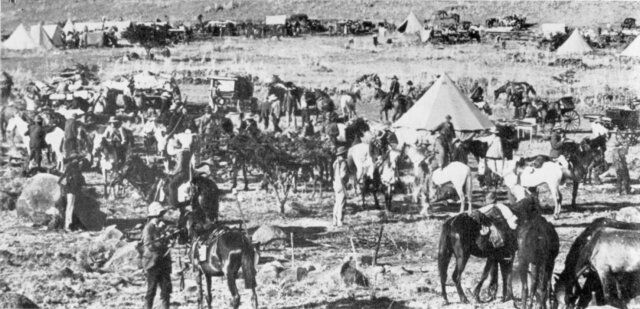

 The South African
The South African
by Neville Gomm
What always impresses one about the South African War is the enormous distances that were covered on horseback. Many horses were lost as a result of fatigue alone. These sturdy animals played an enormous part in the guerrilla war phase of the war which commenced in the Cape in September, 1900. What follows is a brief description of the travels of a Commando under Commandant (later General) Pieter Hendrik Kritzinger. Their activities cover a period from 15th December, 1900 until 16th December, 1901 when Kritzinger was wounded and taken prisoner. The aim of the Boers with the second invasion of the Cape was to make the British war effort as difficult as possible by disrupting their lines of communication, attacking columns of troops, creating at atmosphere of restlessness through their presence, to undermine morale, and to give new courage to the still persevering Boers.
The driving force behind the move to invade the Cape a second time was President Steyn who was prepared to go to the colony himself. In this he enjoyed the support of the Free State commander, General de Wet, who had been busy building up a crack fighting force for some time.
General Christiaan Rudolph de Wet(1) decided to lead the entire force available to him on the assault. It was decided to attack from two sides. At one point, somewhere between the Norvals Pont and Hopetown railway bridges, a commando under Justice J.B.M. Hertzog(2) would cross the Orange River(3) and operate in the western area of the Cape while, at another point in the Odendaalstroom region, General de Wet would cross the river himself to keep the British occupied in the Central and Eastern Cape.
Justice Hertzog managed to cross the Orange River at Sanddrif near Philippolis on 16th December, 1900 with 1 200 men. After the crossing he headed in a westerly direction with his commando, a sub-division of which travelled as far as Lamberts Bay on the west coast.
General de Wet, however, was carefully watched by the British and he only managed to reach the Orange River near Odendaalstroom where the river was in flood after heavy rain. At other points the British troops held such strong positions that the Free Staters had to swing northwards and cross the Caledon River. This was not done before a small unit under Commandant P. H. Kritzinger, Captain W. D. Fouche and Captain Gideon Scheepers(4) was sent in the direction of Rouxville with orders to cross the Orange River as soon as the opportunity presented itself.
Kritzinger, now an Assistant Chief Commandant, had good fortune. After encountering a troop of 2nd Brabant's Horse who tried to stop him near Zastron on 13th December, 1900, he crossed the Orange River with 300(3) men and a Maxim at a point five miles west of Odendaalstroom on the night of 15th December, 1900. The Maxim was soon abandoned as it was too heavy to handle.
Pieter Hendrik Kritzinger was born near Port Elizabeth in 1870. When he was about 12 the family moved to the Free State where he grew up and became a citizen of the Republic. He later farmed in the Rouxville district and when war broke out he joined the Rouxville Commando which was commanded by Commandant (later General) J.H. Olivier. In August, 1900, Olivier was captured and Kritzinger became commander of the Rouxville Commando under the leadership of General de Wet. Kritzinger was also with General de Wet when the latter captured seven guns and 117 wagons during the battle of Sanna's Post near Bloemfontein towards the end of March, 1900.

General P.H. Kritzinger, February 1902
(With acknowledgements to the Cape Archives)
The invasion by Hertzog and Kritzinger in December had stirred up revolt against British rule. Martial law was imposed in the Northern Cape on 20th December, 1900. On 27th December, 1900, martial law was extended to Beaufort West and Carnarvon, on 7th January, 1901 to the Western Cape, and finally on 17th January, 1901 to the whole of the Cape.
Once across the river Kritzinger moved on and occupied the small town of Venterstad with the aim of obtaining arms ammunition and equipment of which there was a severe shortage among the men. The small British garrison of 50 men surrendered without much trouble and the members of the commando immediately began to replenish their supplies. However, Kritzinger and his men were not allowed to tarry at Venterstad. Within a week of his crossing the Orange River the British were prepared to square accounts and for the next few months the commando became the daily target of the British troops.

On 19th December, 1900, Kritzinger's men clashed with troops under Grenfell(6) near Venterstad. Kritzinger's main purpose was to foster unrest in the land whence the Voortrekkers originally came so he led his men southwards in the direction of Steynsburg. He had not proceeded very far before he realised that this route was so well patrolled that he was forced to swing towards Stormberg in the east. Before he reached the railway line between Stormberg and Steynsburg he again found the area so well occupied that he had to turn round and head in a northwesterly direction.
By using this side-stepping manoeuvre he managed to cross the main railway line to Port Elizabeth at a point south of Arundel between Naauwpoort and Colesberg before 30th December, 1900. Soon afterwards he was at New Bethesda where the British unsuccessfully tried to corner him. Kritzinger and Scheepers then trekked in the direction of Richmond and Murraysburg before moving south towards Aberdeen and Willowmore in two detachments.
They pushed on to Oudtshoorn and Uniondale and went close to the Indian Ocean near Mossel Bay where, as Kritzinger said "It was time for us to retrace our steps, for we could certainly go no further on horseback."

Kritzinger's Commando in the Cape Colony.
Thereafter they moved through columns of British troops to Aberdeen and Pearston where they attacked the occupying forces. Having obtained horses and ammunition the commando moved on to Somerset East and into the Bedford district.
Moving northwards Kritzinger was cornered while en route to Tarkastad and Cradock but managed to escape to Molteno. At Maraisburg he divided his commando. Smaller units under Captain Lötter(7) and Scheepers returned to Steynsburg. Kritzinger had hoped to distract the attention of the enemy by this move but was doggedly pursued and eventually had to follow Lötter and leave the Cape on 29th April, 1901. Two commandos under Scheepers and Fouch‚(8) remained in the Cape.
After moving around and being involved in various encounters in the Rouxville and Philippolis areas for some time Kritzinger again crossed into the Cape on 16th May, 1901 bringing with him a reinforcement of 500 men. 'The Times History of the War says: "The winter campaign in Cape Colony may be said to have begun in the middle of May with the return of Kritzinger bearing the rank of assistant commander-in-chief. . . "
Between Steynsburg and Theebus on the railway line Kritzinger re-united with Fouch‚ and split his commando in three. Lötter went to Tarkastad, Commandant Smith(9) to Maraisburg, and Kritzinger trekked to Molteno. Reunited once more with Lötter, Kritzinger and his men crossed the line to Jamestown which they captured after a fierce battle on 2nd June, 1901.
The British blockhouse system which came into large scale application in the Cape from July, 1901(10) had no visible effect on the commandos. Kritzinger later said the blockhouses were ideal to catch women and children and especially cattle and sheep but as a means of catching burghers they were a failure. Also, Kritzinger's return to the Cape had caused Lord Kitchener to become furious particularly after all the preparations and efforts which had been made to capture the Boers.
Kritzinger was subsequently pursued by two British columns and surprised on two occasions. He barely managed to lead his men to safety and decided to divide his forces once more. Lötter was sent to Middelbueg and Kritzinger travelled in the direction of Cradock where his commando had a skirmish with troops under Colonel Eyre Crabbe in the mountains near the town on 21st July, 1901. On 21st June, 1901, Kritzinger had captured part of the Midland Mounted Rifles near Maraisburg.
Soon after the encounter with Crabbe, Kritzinger came into contact with Krepp(11) whom he dealt a severe blow by taking all his horses. Kritzinger then left for Tarkastad where he found a small group of men under Fieldcornet C. Botha.(12) Botha gave Kritzinger, who had become ill on the farm Middelwater,(13) invaluable aid but the British pressed on and he fled to the Free State a second time.
Kritzinger had no peace in the Southern Free State and with his horses in poor condition he retreated to Ladybrand. At Rouxville he met General Smuts(14) who was on his way to the Cape. Smuts was able to get a full report on the situation there from Kritzinger. After resting his men and horses for some time and waiting for spring, Kritzinger followed. He re-entered the Cape by crossing the Orange River during the night of 11th December, 1901. Kritzinger was fortunate in finding a sandbar over which it was possible for his 101-man commando to cross the river in safety. Before crossing the river he attacked about 100 men of Lovat's Scouts who were sleeping in their camp at Quaggafontain. Kritzinger was then hotly pursued by Thorneycroft (of Spioenkop fame) but the latter was unable to catch him.
The commando went to Colesberg but on the first night there, was attacked. Thanks to Kritzinger's able command, all his men escaped safely. The British were now more alert. Moving northwards he was pursued by the 5th Lancers who gave Kritzinger's men and horses no respite. In this rough terrain the animals were subjected to appalling demands and at the end of an exhausting day, 130 horses were abandoned by the Commando somewhere in the Hanover district.
The pursuers came on relentlessly and on 16th December, 1901, the 150-man commando was cornered on the Naauwpoort/De Aar railway line at Fransmanskop near Hanover where a line of blockhouses had been erected. The men had to cross the railway line in broad daylight, Fieldcornet J. Fraser and a number of men raced ahead to cut the fence(15) on Kritzinger's orders and the commando stormed through under a hail of bullets from the blockhouses. When an armoured train arrived on the scene the men were several thousand yards away safely behind a hill.
During this hectic breakthrough the Boers experienced one of their worst moments in the Cape. Assistant Commandant-General Kritzinger was wounded and taken prisoner by Lieutenant-Colonel Beauchamp Doran. Relating the incident, Kritzinger said: "I was waiting at the railway line for all the burghers, apart from about 10 of them whose horses had failed them, to cross. Then I followed the commando. But when I turned around for one more look, I saw one of my men hobbling across the line on foot. I immediately went to his aid, and was again the target of the enemy fire from which we had just escaped. While I rode back, one of my officers - Fraser - who saw me turn around, offered his services. He did not want me to be subject to the enemy fire again, and insisted that I rejoin the commando immediately. He would attend to the struggling man. I accepted his friendly offer, but just as I turned my horse to ride back, I felt a sudden shock.
"In a flash a bullet tore through the muscles of my left arm, and passed through my lungs, just missing the heart. It happened so suddenly that for a few seconds I did not realize that I had been wounded. I stayed in the saddle until a few burghers came to my aid. They lifted me from the horse carefully, wrapped a blanket around me and carried me to a place of safety. At first I was determined to accompany my commando to a spot where I could recover in safety, but I soon became aware of the seriousness of the wound, and realised that without proper nursing it would become infected, possibly at the cost of my life. My men also thought it impossible for me to stay with them, and decided to send me to a British hospital for medical care."
Commandant Louis Wessels took over the command of Kritzinger's commando and carried on with the job of harassing the British.
Kritzinger was taken to Naauwpoort by ambulance where he later recovered. Afterwards he was imprisoned at Graaff Reinet with Gideon Scheepers where he, like Scheepers, would undoubtedly have been sentenced to death. However, Advocate F.H.G. Gardiner who later became Judge President of the Cape, ably defended Kritzinger who was acquitted on all the charges brought against him.
BIBLIOGRAPHY AND NOTES:
Return to Journal Index OR Society's Home page
South African Military History Society / scribe@samilitaryhistory.org